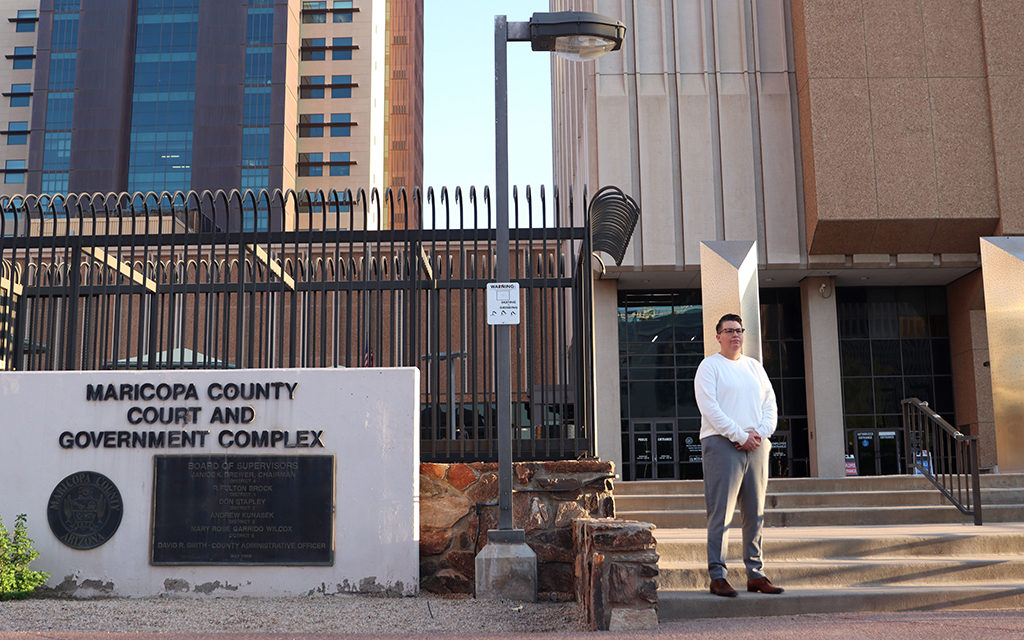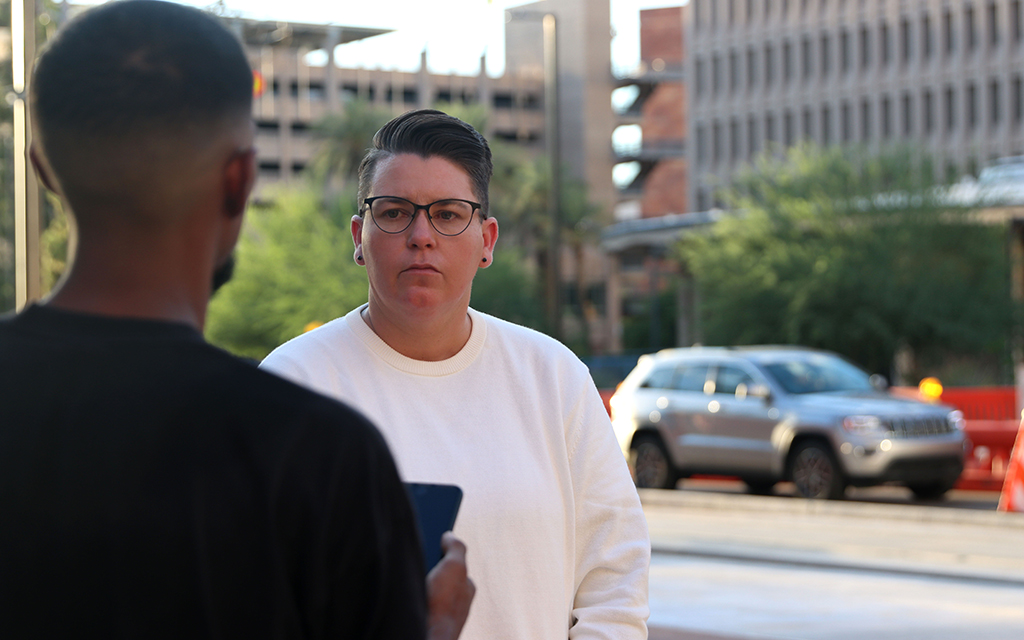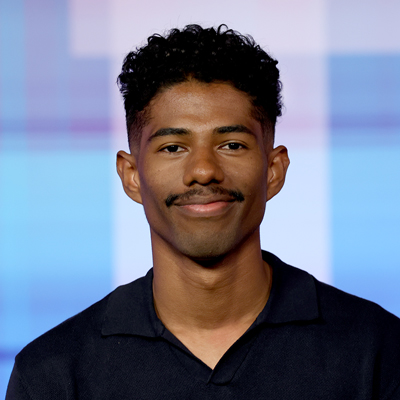
To shore up dwindling ranks, police departments hire more civilian investigators
Sept. 20, 2022
PHOENIX – Hiring civilian investigators isn’t a new concept.
Mesa, Arizona, police started its program in 2009. And when Chief George Gascón moved to San Francisco to lead that department, he took the idea with him.
But the movement has gained steam recently as departments across the country try to shore up their dwindling ranks of sworn officers.
Baltimore police made national headlines in April when the city leaders announced they planned to hire 35 civilian investigators and eliminate 30 unfilled sworn officer positions. In a statement, Mayor Brandon M. Scott called it a “crucial first step” to modernize the approach to law enforcement.
Phoenix Police Department also gained attention in March when it announced a similar move. At the time, the department had more than 400 unfilled positions for sworn officers.
“We found ourselves a little shorthanded, so we moved some sworn people from detective spots out and back out into patrol,” said Sgt. Jason Davis, the administrative sergeant for property crimes.
Davis said the COVID-19 pandemic and the nationwide uproar against police after the May 2020 murder of George Floyd coincided with a large number of retirements from Phoenix police.
Hiring civilian investigators would “make sure crimes get hands-on attention and, hopefully, solved in a timely manner,” the March news release said, calling for the community to join the department.
“It stems directly from our long-standing desire to civilianize some of the things that we do here,” Davis said.
Civilian investigators have many of the same duties as an officer, such as reviewing evidence, interviewing witnesses, taking reports and carrying out administrative tasks at the office. The department calls these tasks the “behind-the-scenes” work of investigations.
But unlike sworn officers, Davis said, they aren’t authorized to carry a firearm or make arrests.
Departments nationwide face staffing shortages. Nearly 200 police departments reported a 5% decrease in hires, an 18% increase in resignations and a 45% increase in retirements from 2020 to 2021, according to a national survey by the Police Executive Research Forum and released in 2021.
The Phoenix City Council had approved 25 civilian investigator positions for the past fiscal year and 25 for this fiscal year, which began July 1. Most of the first group will have started by mid-October, according to an email from the department.
“They can work their case all the way to the end,” Davis said. “When it comes time to actually arrest someone, they just have to work with a sworn officer to effect that arrest.”
Shannon O’Leary began her career as a detention officer, and she became a civilian investigation specialist for Mesa police. She has served in that role for about nine years.
She said she doesn’t do anything different from sworn officers, except she doesn’t carry a gun, doesn’t have arrest powers and doesn’t “get into physical altercations with people.”
“But as far as learning the law and applying the law, none of that changes,” said O’Leary, who writes reports, canvasses crime scenes, looks for surveillance video and tries to find eyewitnesses.

Shannon O’Leary, a civilian investigation specialist for Mesa police, speaks with reporter Nathan Collins in front of the Maricopa County Court and Government Complex in Phoenix, Arizona, on Sept. 14, 2022. (Photo by Alexia Faith/Cronkite News)
O’Leary said she received training on the collection and preservation of evidence at a crime scene.
Unlike a patrol officer, though, criminal investigation specialists know their suspects are “long gone.” While officers wear black uniforms, O’Leary’s is gray. She also drives an unmarked vehicle, which can help with people who don’t want to call attention to the fact that police are there.
“They like the fact that it’s very kind of quiet in a sense,” she said.
“I feel like our customer-service level’s a lot better and a lot more top notch,” O’Leary said. “So that’s what we really strive (for) is high, high customer service.”
O’Leary said she’ll go over evidence, follow up with victims and assist with calls for service with patrol officers. They can screen information before heading out to calls.
“We want to see if we’ve had any kind of ties with them in the past, if they have any kind of violent tendencies in the past or mental health issues,” she said. “And if we see stuff like that, then we will say, ‘Hey, I’m not going to take that call.’ And I let the officer take it.”
When Gascón brought the civilian investigator idea to San Francisco in 2010, he faced skepticism from the police union about taking jobs away from sworn officers, according to media reports.
In Phoenix, the Phoenix Law Enforcement Association responded to the City Council’s initial efforts through an email stating that the association appreciated the effort to hire more civilian positions during the staffing crisis, but it urged the council “to adopt a long-term plan to properly fund and staff sworn police officers.”
Davis said the new positions help solve simple cases in a timely manner and allows sworn detectives more time to complete in-depth investigations.
“This new spot is designed to attract people that have experience with investigations back into the profession,” he said.
Davis described such experience as investigating bank fraud or insurance claims, for example. Since civilian investigators are not expected to be in the field as much as patrol officers, they undergo lighter training than sworn officers and learn tactics specific to their bureau.
The Phoenix investigators are dispersed across the department’s bureaus, including violent crimes, drug enforcement and family investigation.
“It’s exciting to see that we could get some civilian people here,” said Davis, who has worked in investigations since 2004.
Civilian positions are common in the Phoenix Police Department: from secretaries, to training coordinators and staff for the Civilian Oversight Bureau.
However, the Phoenix civilian investigator position will be the first job that allows civilians to carry out many of the same tasks as detectives and police officers .
O’Leary said she loves her job. Although patrol officers have a lot of liability and must deal “with a lot of people who just do not like the police,” she said, “I don’t have to deal with any of that.”
“Literally, I’m dealing with people who are in – I don’t say crisis mode, but they’re in a … bad situation where they feel completely violated – and so it makes me feel good that I can help them.”
Salma Reyes is a Hearst Foundation fellow. Nathan Collins is the Don Bolles/Arizona Republic fellow.
Come back on Oct. 3, when we start publishing the main News21 “In Pursuit” project.
Our content is free to use. If you want to republish this story, find our terms of use here and download the text story and assets.

